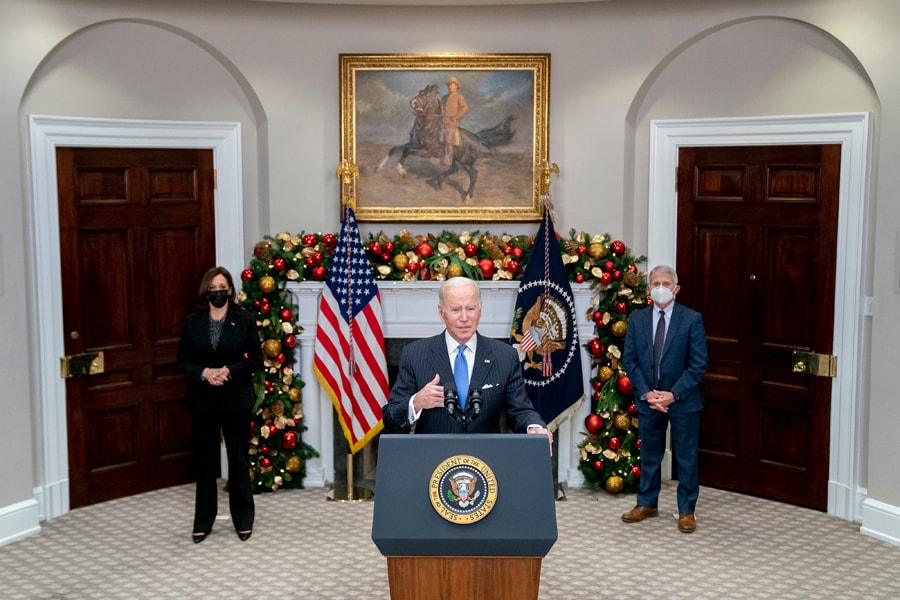
Fragmented reactions hinder global fight against Omicron variant
Little is known about omicron beyond its large number of mutations and it will be weeks before scientists can say with confidence whether it is more contagious and whether it causes more serious illness
 President Joe Biden speaks on the U.S. response to the new Omicron variant of the coronavirus, at the White House in Washington on Monday, Nov. 29, 2021, as Vice President Kamala Harris, left, and Dr. Anthony Fauci, director of the National Institute of Allergy and Infectious Diseases, look on. His remarks come as federal health officials urge vaccinations and as countries around the world institute travel restrictions to curb the variant’s spread. (Stefani Reynolds/The New York Times)
President Joe Biden speaks on the U.S. response to the new Omicron variant of the coronavirus, at the White House in Washington on Monday, Nov. 29, 2021, as Vice President Kamala Harris, left, and Dr. Anthony Fauci, director of the National Institute of Allergy and Infectious Diseases, look on. His remarks come as federal health officials urge vaccinations and as countries around the world institute travel restrictions to curb the variant’s spread. (Stefani Reynolds/The New York Times)
ROME — In a wrenchingly familiar cycle of tracking first cases, pointing fingers and banning travel, nations worldwide reacted Monday to the omicron variant of the coronavirus in the piecemeal fashion that has defined — and hobbled — the pandemic response all along.
As here-we-go-again fear and resignation gripped much of the world, the World Health Organization warned that the risk posed by the heavily mutated variant was “very high.” But operating once again in a vacuum of evidence, governments chose approaches that differed between continents, between neighboring countries, and even between cities within those countries.
Little is known about omicron beyond its large number of mutations; it will be weeks, at least, before scientists can say with confidence whether it is more contagious — early evidence suggests it is — whether it causes more serious illness, and how it responds to vaccines.
In China, which had been increasingly alone in sealing itself off as it sought to eradicate the virus, a newspaper controlled by the Communist Party gloated about democracies that are now following suit as Japan, Australia and other countries gave up flirting with a return to normalcy and slammed their borders shut to the world. The West, it said, had hoarded vaccines at the expense of poorer regions, and was now paying a price for its selfishness.
In the United States, federal officials called Monday on vaccinated people to get booster shots. President Joe Biden sought to reassure Americans, saying that the new variant is “a cause for concern, not a cause for panic” and that his administration is already working with vaccine manufacturers to modify vaccines, should that prove necessary.
©2019 New York Times News Service







